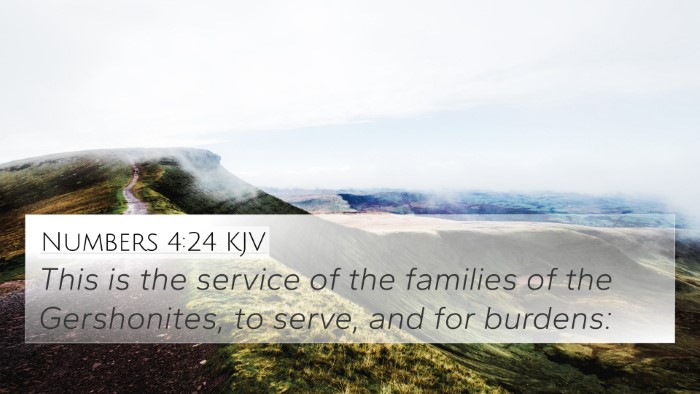Understanding Numbers 7:7
Numbers 7:7 states: "Two wagons and four oxen he gave unto the sons of Gershon, according to their service."
This verse occurs during the detailed accounts of offerings brought by the leaders of Israel for the dedication of the altar,
highlighting the organization and precise distribution of tasks and responsibilities among the Levites. Here is a summarized explanation of its meaning based on various public domain commentaries:
Summary of Insights
- Matthew Henry:
Henry emphasizes the significance of order and structure in God's service. The distribution of these gifts for the Gershonites illustrates that God provides the means for His work and ensures that every tribe has a role. The wagons and oxen symbolize not only physical support but also God's provision for the Levites to perform their duties effectively.
- Albert Barnes:
Barnes points out the logistical need for the Gershonites who were responsible for transporting the tabernacle and its furnishings. The wagons and oxen served as vital tools for their service, indicating that God recognizes and provides necessary resources for spiritual duties.
- Adam Clarke:
Clarke highlights that the two wagons and four oxen were specifically divided based on the respective needs of the Gershonites’ responsibilities. He underlines that their service involved the care of fragile and important items, which would require careful handling and transportation.
Bible Verse Cross-References
To fully comprehend Numbers 7:7, we can explore various related verses that create connections between Bible verses concerning themes of service, provision, and organization in the community of believers:
- Exodus 25:13-15:
This passage describes the construction and transportation of the Ark of the Covenant, illustrating the importance of order in worship.
- 1 Chronicles 23:24:
This verse lists the Levites and their duties, indicating how each group was organized for service.
- Numbers 4:24-28:
These verses elaborate on the responsibilities of the Gershonites, connecting to their need for adequate resources.
- 1 Corinthians 12:4-6:
Paul speaks of different gifts and services within the body of Christ, showing the importance of each member in God's plan.
- Acts 6:1-4:
This narrative discusses the organization of the early church to ensure that all needs were met, similar to the structured service of the Levites.
- Hebrews 13:16:
This verse speaks to the importance of doing good and sharing, emphasizing the responsibility within a community of faith.
- Philippians 4:19:
The assurance of God's provision in Christ relates to how He provided for the Israelites in their service.
- Colossians 3:23-24:
This encourages believers to work heartily as for the Lord, reflecting the diligent service of the Levites.
- Ephesians 4:12:
Describing the building up of the body of Christ, this parallels the duties assigned to the Levites and their vital role.
- Matthew 25:14-30:
The parable of the talents depicts the expectation of service and stewardship, akin to the responsibilities outlined in Numbers.
Thematic Bible Verse Connections
The organization of the Levites in Numbers 7:7 can also serve as a model for church organization today.
It lays out how God’s people are to coordinate their efforts in ministry, ensuring that everything is done decently and in order.
Various themes arise from the analysis of cross-referenced scriptures:
- Service: Reflects on the collective effort required in ministry.
- Provision: Emphasizes reliance on God for the tools needed for service.
- Community: Illustrates the necessity of working together towards a common goal.
- Organization: Highlights the importance of structure in achieving efficiency.
Conclusion
In conclusion, Numbers 7:7 offers profound insights into God’s design for order and support within the community of faithful believers.
Through cross-referencing this verse with others throughout the Scriptures, one can appreciate the interconnectedness of God’s word,
which transcends time while ensuring that His work is carried out as effectively as possible.
Understanding these connections can enhance one’s interpretation and application of biblical principles in daily life.




